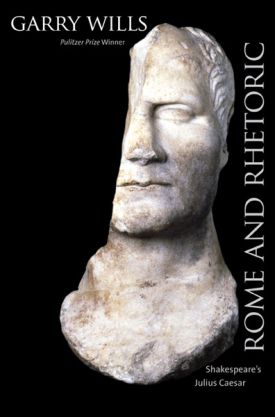Rome and Rhetoric
From The Washington TimesRome and Rhetoric: Shakespeare’s Julius Caesar
by Garry Wills
Yale U.P., 200 pp., $25
First, let’s acknowledge that Garry Wills’s book-length discussion of Shakespeare’s Julius Caesar is full of useful information and likely to be an indispensable companion to students of the play in years to come. It collects in one place much of what you need to know about Shakespeare’s knowledge of the classical world and, up to a point, it offers a useful account of what he was doing with it in the play. Mr Wills measures Shakespeare against his Greek and Roman models — not only Plutarch’s Lives, which was his principal source in Julius Caesar as it was in his other plays about the ancient world, but also the Roman rhetorical tradition consisting of carefully classified figures of speech thought to be instrumental in the arts of persuasion. This was still a big part of the basic education of Elizabethan schoolboys — even at Stratford, where Shakespeare presumably acquired his “small Latin and less Greek.”
That, by the way, was the testimony of Ben Jonson, who was a much more learned classicist than Shakespeare, as this implied censure would suggest, but who, says Professor Wills, lacked Shakespeare’s gifts of synthesizing his learning for the popular stage. Where Jonson’s plays “are congested and clogged with their own learning. Shakespeare has a feel for Roman rhetoric, Stoicism, nobility, and cynicism that are immediately convincing,” he writes.
Garry Wills will be known to readers as himself one of our more learned men — or, as they are often called these days, “public intellectuals” — but is probably better known for his polemics than for his scholarship. Or for polemics in the form of scholarship. There is not a lot of that in this volume, happily, but what there is at some points crucially limits what he is able to tell us about Shakespeare. For instance, he believes that, in Julius Caesar, Shakespeare was criticizing if not ridiculing the Roman idea of honor in a way much more familiar today than it would have been in Elizabethan England.
Thus he tells us that “each leading character has his own self interest in mind, his own pride (which he thinks of as honor).” This is not untrue, but it begs all kinds of questions as to what honor actually is. Or was. Later he writes that “the way these men mirror one another shows how the political dynamics of an honor-fueled drive for power makes competitors resemble their opposites.” But don’t competitors generally resemble their opposites — that is, those they are competing against — in any case? Some of these competitors are said to “perish in the illusory name of Roman nobleness.” But if they perish in its name, what makes that name illusory? Here, as elsewhere, Professor Wills assumes a contemporary, not an Elizabethan idea of honor.
“Shakespeare,” he writes, “looks below and behind the poses of honor with which this play is filled” — which may be true without implying that “the vices of Rome poison even the traces of nobility left in friendship.” That would be a familiar point of view to us, but it would not have been to Shakespeare’s contemporaries, who took the ancient idea of honor very seriously. It is possible, of course, that Shakespeare anticipated a point of view that was not common until three centuries after his death. To some degree he seems to me to have done so too. But Professor Wills is not well-advised to push this insight too far, or to assume that it implies an identity of viewpoint with his own.
But that is the kind of thing we are used to from our public intellectuals. The scholar tells us how people of the past thought; the intellectual takes that thought and attempts to fit it anachronistically into an ideological system very much of the present day. At one point, for instance, Professor Wills digresses from his account of Julius Caesar to characterize Menenius’s famous parable of the belly in Coriolanus as an early example of “trickle-down theory” — even though, he says, “Menenius is a better propagandist than most trickle-down theorists.” Not only would this have come as news to Menenius, but the idea of “trickle-down theorists” is an invention of the late 20th century left. Those who make the case he so derisively characterizes — that “wealth must go first to the rich, who will create work with it for the poor” — see themselves as merely describing the way the world works. The “theory” in this case is the theory of gravity, also known as the basic law of physics that things, including money, do not trickle up.
The “must” part is supplied by the contemporary ideologue in order to make this descriptive principle into a theory, to which he then may be understood to be opposing an (implied) counter-theory of up-trickling wealth — a theory that, perhaps fortunately, he never has to spell out. It is a typical leftist trick, this of treating the utopian theory as being on all fours with reality, which is thus reduced to mere theory itself. It ought to be included in the catalogue of rhetorical devices he dazzles us with in his account of Brutus and Antony’s rival speeches over dead Caesar’s body — except that neither the Romans nor the Elizabethans had invented it yet. Or would have been persuaded by it.
Discover more from James Bowman
Subscribe to get the latest posts to your email.







